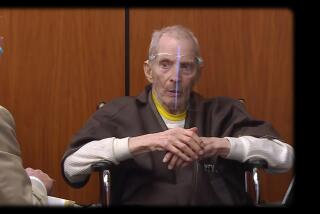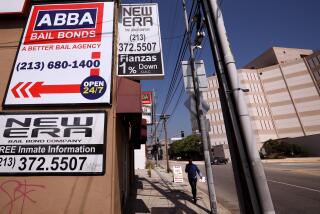Durst’s $3-Billion Bail Ruled Excessive
HOUSTON — No one looked more stunned than real estate heir Robert Durst when a jury last year acquitted him of murder, despite his admission that he had cut up a corpse and tossed it into Galveston Bay. But Durst’s joy was short-lived: He remained in custody on evidence tampering and bond-jumping charges after a judge set bail at $3 billion, an amount his lawyers called “ridiculous.”
A Texas appeals court agreed Wednesday, finding “no conceivable justification for bail amounts remotely approaching the order of magnitude of those imposed in this case.” The 14th Court of Appeals called the bail “unconstitutionally excessive,” with one justice suggesting an amount between $450,000 and $600,000.
Galveston County Dist. Atty. Kurt Sistrunk, in a statement released by his office, said the opinion “speaks for itself” and that he would not seek a rehearing by the appeals court.
Texas District Judge Susan Criss, who set the disputed bail, said in an interview that she would determine a new amount at a hearing to be held as early as next week. “If [Durst] can make the bond, he’ll be released,” Criss said. She would not comment on the appeals court decision.
“Never in the history of the world has there been a bail of $1 billion, much less $3 billion,” said Durst’s lawyer Dick DeGuerin. “It’s pretty clear that the bail was unreasonable and was going to be changed.”
Durst, 61, is the multimillionaire son of a late real estate mogul whose company helped redevelop New York’s Times Square.
During his murder trial in Galveston, Texas, in October, Durst testified that a gun had gone off accidentally while he was defending himself against an enraged neighbor, 71-year-old Morris Black. Durst said that he panicked, dismembered the corpse and left town. He was arrested within a week, posted bail and fled. Six weeks later, he was arrested in Pennsylvania after shoplifting a sandwich.
Jurors acquitted Durst in November, saying prosecutors had failed to prove that he intentionally killed Black in September 2001. Criss -- who presided over Durst’s murder trial -- cited his history as a flight risk when she set the $3-billion bail on charges of jumping bond, failing to appear in court and tampering with evidence.
If he is released from Galveston County Jail, Durst will have to surrender his passport, stay in the area unless the court allows him to leave, and be kept -- at his own expense -- under 24-hour supervision by a licensed peace officer, DeGuerin said.
A trial date for the outstanding charges against Durst has not been set, Criss said, but the case will probably be heard this year.










